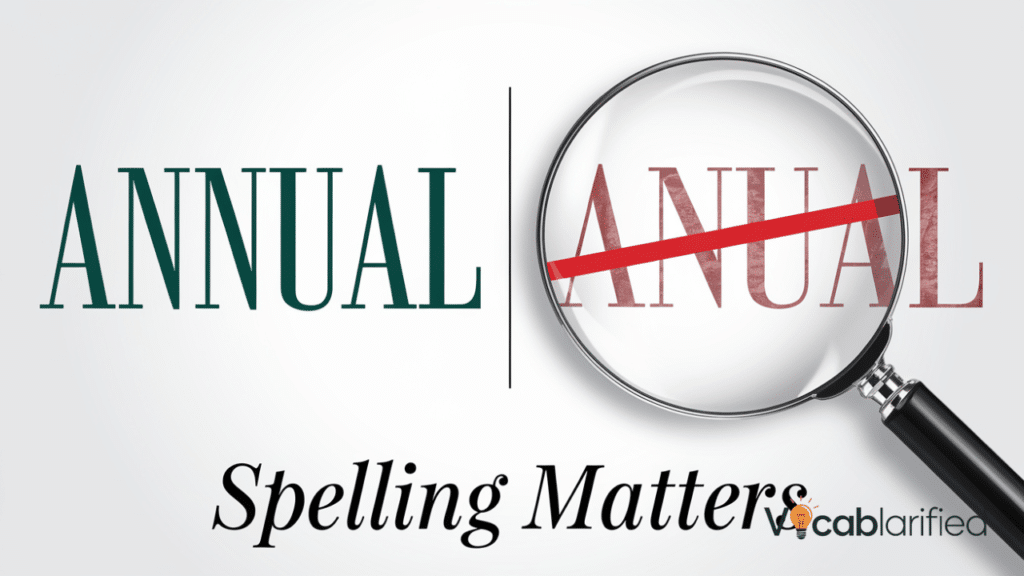In the vast landscape of English vocabulary, some words seem to cause more confusion than others.
One such pair that often leaves writers scratching their heads is “anual” and “annual.” This article aims to settle the debate once and for all, providing clarity on the correct spelling and usage of these terms.
A Common Conundrum
Every year, countless individuals find themselves pondering over whether to use “anual” or “annual” in their writing. This uncertainty spans across various contexts, from casual conversations to formal contexts like business reports and academic papers.
The Verdict
Let’s cut to the chase: annual is the correct spelling. “Anual” is a common misspelling that has no place in standard English. Understanding this distinction is crucial for clear communication and maintaining credibility in both written and spoken language.

You Might Like: Priviledge Or Privilege: What Is The Correct Spelling?
Origins and Etymology
The word “annual” comes from the Latin “annualis,” meaning yearly. This root gives us a clue to its meaning and correct spelling. The double ‘n’ in “annual” reflects its Latin heritage, a feature often lost in the misspelled version “anual.”

Usage in Context
To better understand how “annual” is used correctly, let’s look at some common phrases and their meanings:
| Phrase | Meaning |
|---|---|
| Annual report | A yearly financial summary |
| Annual meeting | A gathering that occurs once a year |
| Annual review | A performance evaluation done yearly |
| Annual budget | Financial plan for the upcoming year |
| Annual leave | Vacation time allotted each year |
| Annual subscription | A service renewed every 12 months |
| Annual rainfall | Total precipitation in a year |
| Annual growth | Increase over a one-year period |
| Annual festival | Celebration held once a year |
| Annual checkup | Yearly medical examination |
These phrases all refer to events or occurrences that happen every year, reinforcing the connection between “annual” and its meaning.
The Pitfalls of “Anual”
Using “anual” instead of “annual” can lead to confusion and may damage your credibility. Imagine sending an email to your colleagues about an upcoming “anual meeting.” This simple mistake could make you appear careless or unprofessional.
You Might Like: Forrest Or Forest: Clearing Up The Spelling Confusion
Real-World Scenarios
Business Communication
Sarah, a marketing manager, was preparing an important presentation for her company’s annual meeting. She diligently crafted her slides, ensuring all the data was accurate. However, she overlooked a crucial detail – the title slide read “Anual Marketing Strategy.” This small error caught the eye of the CEO, casting a shadow over Sarah’s otherwise impeccable presentation.

Academic Writing
Professor Johnson was reviewing a student’s thesis on climate change. The paper was well-researched and articulate, but a recurring error stood out. The student had consistently used “anual temperature variations” instead of “annual temperature variations.” This mistake, though seemingly minor, affected the overall quality of the work.
Digital Age Challenges
In the era of autocorrect and spellcheck, one might assume such errors would be caught easily. However, some digital tools may not flag “anual” as an error, especially if it’s used consistently throughout a document. This highlights the importance of human proofreading and a solid understanding of correct spelling.
You Might Like: Momma or Mama: Clearing Up The Confusion
The Impact on Search Engine Optimization
In the digital marketing world, using the correct spelling is crucial for search engine optimization (SEO). Content with “anual” instead of “annual” may not rank well for intended keywords, potentially losing valuable traffic and engagement.

A Side-by-Side Comparison
To further clarify the key differences between “anual” and “annual,” let’s look at a side-by-side comparison:
| Aspect | Anual | Annual |
|---|---|---|
| Spelling | Incorrect | Correct |
| Meaning | None (misspelling) | Occurring yearly |
| Usage in formal writing | Unacceptable | Acceptable |
| Frequency in English | Rare (error) | Common |
| Etymology | N/A | Latin “annualis” |
| Variations | None | Annually, biannual |
| Compound words | None | Semi-annual, annual pass |
| Recognition by dictionaries | Not recognized | Widely recognized |
| Use in legal documents | Never | Frequently |
| Autocorrect response | Often flagged | Not flagged |
This comparison clearly shows that “annual” is the only acceptable form in standard English.
Common Contexts for “Annual”
Understanding where “annual” is commonly used can help reinforce its correct usage. Here are some frequent contexts:
Annual Reports
Companies release annual reports to provide shareholders and stakeholders with a comprehensive overview of their financial performance and activities over the past year. These documents are crucial for transparency and decision-making.
Annual Celebrations
Many cultures have annual celebrations that mark important dates or seasons. These events, recurring every year, become cherished traditions that bring communities together.
Annual Subscriptions
In the digital age, many services operate on an annual subscription model. From software licenses to magazine subscriptions, this payment structure has become increasingly common.
You Might Like: Oversight Vs. Oversite: Understanding The Key Differences
The Importance of Accuracy in Various Fields
The correct use of “annual” is vital across numerous professional fields. Let’s explore how it’s used in different sectors:
| Field | Usage of “Annual” | Example |
|---|---|---|
| Finance | Financial reporting | Annual balance sheet |
| Human Resources | Employee reviews | Annual performance evaluation |
| Education | Academic calendar | Annual enrollment period |
| Healthcare | Regular check-ups | Annual physical examination |
| Agriculture | Crop cycles | Annual harvest yield |
| Meteorology | Climate data | Annual precipitation levels |
| Retail | Sales events | Annual clearance sale |
| Non-profit | Fundraising | Annual charity gala |
| Government | Budget planning | Annual fiscal budget |
| Sports | Recurring events | Annual marathon |
This table illustrates the widespread use of “annual” across various professional domains, emphasizing its importance in accurate communication.
Informal vs Formal Usage
While the correct spelling remains consistent, the contexts in which “annual” is used can vary from informal contexts to highly formal contexts.
Informal Contexts
In casual conversation or personal communication, you might hear phrases like:
“Are you going to the annual family barbecue this summer?”
“I can’t believe it’s time for our annual spring cleaning already!”
These uses, while correct, have a more relaxed tone suitable for everyday interactions.
Formal Contexts
In business, academic, or legal settings, the use of “annual” takes on a more serious tone:
“The company’s annual shareholder meeting will be held on May 15th.”
“The journal publishes an annual review of significant scientific discoveries.”
In these cases, precision is paramount, and using the correct term “annual” is non-negotiable.
The Role of “Annual” in Time Management
The concept of “annual” plays a significant role in how we organize and perceive time. It provides a natural cycle for planning, review, and goal-setting. Many people use the annual calendar as a framework for personal and professional development.
Cultural Significance
Different cultures around the world have their own annual events that hold great significance. These can range from religious observances to national holidays. Understanding the correct use of “annual” is crucial when discussing or writing about these important cultural occurrences.
The Scientific Perspective
In scientific fields, particularly those dealing with cyclical phenomena, the term “annual” is frequently used. Biologists might study annual migration patterns, while geologists examine annual rock formation rates. The precision of language in these fields makes the correct use of “annual” especially important.
Digital Tools and Language Learning
As language learning increasingly moves online, digital tools play a crucial role in reinforcing correct spelling and usage. Many language learning apps and platforms include exercises specifically designed to help learners distinguish between commonly confused words like “anual” and “annual.”
The Evolution of Language
While “annual” remains the correct form, it’s worth noting that language is constantly evolving. Some words that were once considered misspellings have, over time, become accepted alternatives. However, this is not the case with “anual,” which remains firmly in the category of errors.
Impact on Professional Image
In professional settings, using the correct spelling of “annual” can significantly impact one’s image and credibility. Whether in a resume, a business proposal, or a formal presentation, the proper use of language reflects attention to detail and competence.
Global English and “Annual”
As English continues to be widely used as a global language of business and academia, the correct use of terms like “annual” becomes even more crucial. Non-native speakers often pay particular attention to these nuances, sometimes outperforming native speakers in formal writing contexts.
The Future of “Annual”
Looking ahead, it’s clear that “annual” will continue to be an important word in our vocabulary. As we increasingly deal with long-term planning and cyclical events, particularly in areas like climate change and economic forecasting, the concept of “annual” occurrences or data points will remain crucial.
Conclusion
In the ongoing debate between “anual” and “annual,” the verdict is clear: annual is the correct spelling. This word, deeply ingrained in our language and culture, plays a vital role in how we communicate about yearly events and occurrences. Whether you’re writing an annual report, planning an annual meeting, or simply discussing your annual celebration, using the correct spelling is key to clear, professional communication. Remember, attention to such details in language use can make a significant difference in both personal and professional contexts. So, the next time you’re about to type “anual,” pause for a moment – your future self will thank you for choosing “annual” instead.

Emma Carter is an experienced blogger at Vocablarified. She enjoys helping people expand their vocabulary and improve their language skills. With a warm and approachable writing style, Emma makes learning new words fun and accessible. When she’s not writing, she loves reading books and discovering new phrases to share with her readers. Emma is passionate about making language learning an enjoyable journey for everyone.







